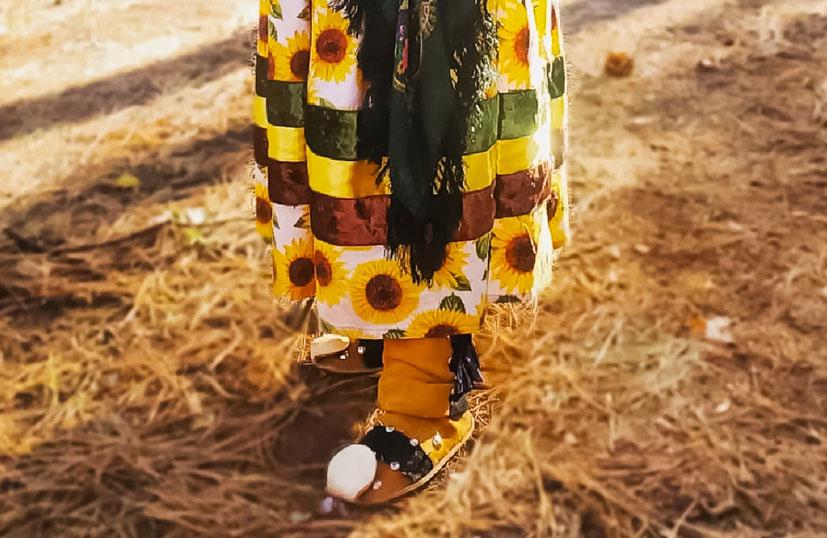That’s what the bully with the new pair of Jordans yelled on the basketball court as he picked up the ball that rolled near me and pointed at my dusty shoes. Behind him, his friends began to laugh in support of his observation of the fact that I had no name brand shoes on my tired feet.
Bạn đang xem: They Wore Moccasins
I sat clueless, not sure how to feel and I simply replied, “My grandma got them for me,” with a hint of pride that my grandma loved me enough to get me shoes for school.
Peering under the hoodie that kept me warm in the crisp fall morning, I noticed all their shoes then I finally realized mine were not like theirs. That was when I felt something I had never felt before—shame, dipped in embarrassment. I ducked my head and pushed my hands further into the pouch of my hoodie, hoping that I could warp time and space and simply disappear.
Unfortunately, that is also when I realized I did not possess the power to bend space and time. I sat quietly as the three Jordans and two pairs of Nikes continued to linger in view. I heard the laughter I would become familiar with in years to come move away until all I saw was the cracked painted cement of the basketball court. For a few minutes I did not move and sat in silence adjusting to the new emotions I felt. I crossed my feet, and as I did I could not tear my eyes away from the shoes my grandmother bought me a week before.
They were black and the white section on the side of the shoe was covered in red dust from the reservation trails that I took to get to school that morning with my cousins. I wiped away the dust as best as I could until the white on my shoes seemed clean. My shoes had laces that kept them from falling off my feet as I walked to school, and they kept them secure to my tired feet the evening before when I rode horses with my cousin. They were shoes—shoes that kept me from stepping on the horned stickers that are hands down more painful than a lone Lego left on the floor (if you know, you know). I was thinking the way my grandmother was probably thinking, but now I felt ashamed of the shoes that took me places and were very good at helping me climb the cottonwood tree at Grandma’s house.
After school that day, I remember looking at my shoes intently when my grandmother placed them by my bedroom door. The concept of wanting something “more” was still alien to me, so I said nothing when she said goodnight. I felt bad about not having what others were proud to own, but I went to sleep that night not knowing where “cheap shoes” would take me someday.
Xem thêm : 99+ Ý tưởng hình xăm bắp tay nam đẹp ý nghĩa, ấn tượng nhất
Years later, in junior high, I played baseball and although most of my teammates wore new cleats, I was rounding third with my latest pair of “cheap shoes.” I kicked the dust up on our dusty baseball field and scored a run for our team. That fall I was on our tiny indoor basketball court and dropping a three to give our team a slight lead. I was not the best player on our team by any means, but whether it was on the court or on the field I still gave it my all and tried to have fun as much as I could. Don’t get me wrong, I was still feeling out of place or “poor” because I did not have $200 shoes on my feet at every game, yet I still showed up for practice. I noticed another kid in my class had broken laces, and it seemed as if he was one homerun away from putting a hole in his own pair of “cheap shoes.” Mine didn’t look too bad compared to his and although we never talked, it assured me that at least my shoes weren’t so bad as his.
I knew my family wasn’t poor. I had hot breakfast every morning, did not know what it felt like to be cold in the middle of winter, dinner was always served, I had a small library of my favorite animal and astrology books, and finally we had a car that took my grandma to the local Indian Health Service where she worked nearly every day. When I started high school, I realized the tradeoff of growing up and wearing off-brand shoes was because my freshman year I was given a desktop computer, a laptop, and then my grandmother paid for home internet services to be installed. Suddenly, I had the world at my fingertips, as I sat at my cheap desk still wearing my cheap shoes and watching silly cat videos that made my poor heart happy.
Soon after leaving the torturous halls of high school behind me, I surprisingly found myself on a flight to Baltimore, Maryland. Days later, the cohort I was part of went to our first session that was held in the coveted halls of the prestigious Johns Hopkins University. There we met the head of healthcare, mental health professionals, and Indigenous scholars that were there to present to us. Even the director of the Indian Health Service was there at the time. I, low key, wanted to ask why we had to wait hours at the ER to only be sent home with ibuprofen… I didn’t. I should have, but I didn’t.
Anyway, a day later I had arrived early to the Bloomberg School of Public Health (at Johns Hopkins), and I remember digging in my pocket for the crumpled bills I had stuffed in my pocket that morning. I was at a café inside the building and, annoyingly, I dropped a penny as I took the messy wad of dollar bills out of my pants pocket to pay for a cup of tea.
As I went down to pick up the coin, I heard a squeak that would haunt me for the rest of the week. My shoes made a noise when I knelt and picked the penny up off the floor. I saw a pair of Gucci loafers directly in front of me. To my right were two pairs of Nikes and to my left I noticed Crocs. Standing up slowly, I hoped they wouldn’t see my Walmarts. I got my tea as I stuffed more coins in my pocket because I couldn’t afford to tip the barista. I remember feeling out of place again, like I did on that basketball court in elementary school.
Instead, this time there was a difference.
There were no pointing fingers or anyone laughing at me, besides the loud Indigenous laughter I heard down the corridor somewhere. It sounded like the rest of my cohort showed up for class. Anyway, back to the moment. We were all there for our daily dose of caffeine while we scrolled through our feeds, all walks of life, existing together in this moment. I did not know the story of that pair of Crocs, those Nikes or those Gucci loafers. The story I did know was of the squeaky twenty-dollar Walmarts that were making their way down the hall. That story of that rez guy in those shoes is probably familiar to you.
Xem thêm : Bảng Màu Phối Đồ Nam: Nâng Tầm Gu Thời Trang và Sự Sành Điệu
You see, he was laughed at and called names growing up. He ran up creek beds and jumped in puddles like some Indigenous Gene Kelly after the Arizona monsoon storms rolled through the rez. He swung from walnut tree branches and chased after Grandpa’s pickup truck when he would come home from work. He has battle scars on his knees from summers that he will never forget. He spent evenings reading on top of his grandma’s house and occasionally dared to daydream about when he would leave the rez and home behind… and there he was, far from home, but the rez was with him wherever he went, whether he liked it or not.
The same dust that was on my cheap shoes all those years ago in elementary school and it was right there on my cheap dress shoes as I stood in the Johns Hopkins Bloomberg School of Public Health in Baltimore, Maryland, in the middle of winter. I thought of going to the bathroom and wiping away the reservation dirt that lightly dusted my shoes, but I simply sipped that overpriced cup of tea as I imagined it was the wild tea that grandma boiled in the old enamel pot on top the woodstove every evening.
I stomped my way down the hall making sure I left particles of dust behind me. I was proud with a hint of a smirk tugging on my lips because I never imagined that one day cheap shoes would take me on a journey from the divorce of my parents, right through the hell of addiction, and finally to the start of my academic dreams.
That moment is when I no longer felt ashamed of what I did not have, but instead proud for what I did. Some of us may not have much and struggle even now, as we pursue our dreams that at times take us far from home. Sometimes we pass up what we want and work hard for what we need. Silent sacrifices that we don’t post on our socials and at times “faking it until we make it.”
Today, I’m sitting on a stump cut from the old cottonwood tree I used to climb when I was kid, as I finish writing this blog. Looking down, I can’t help but smile because my pair of worn-out boots that I occasionally wear with short pants is nothing fashionable to look at still. It doesn’t seem like much, but they are a reminder to me of the difficult times I have walked through recently. So, here’s to you and whatever you wear on your feet. Keep going. Keep walking. Wipe away those silent tears if you must. Just remember, no matter how small the steps are, it is still progress toward your goal. You and I, we come from strong Native women and warriors that kept going in the dead of winter or the scorching summer heat.
So put your Crocs in four-wheel drive, lace up your sneakers, or pull up your boots. We have stereotypes to break and haters to prove wrong. But more importantly, we have our dreams to stumble toward. The only difference between us and our resilient ancestors is that – they wore moccasins.
So, honor them and don’t forget to “rock your mocs” every chance you get.
Markus Altaha is a student at San Carlos Apache College.
Nguồn: https://leplateau.edu.vn
Danh mục: Kinh Nghiệm
This post was last modified on Tháng mười một 21, 2024 10:38 chiều

